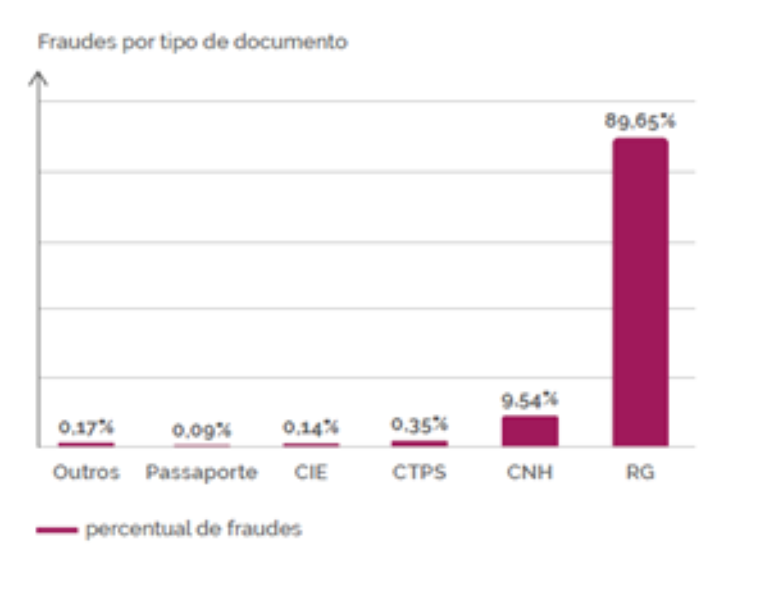According to a CAF survey, people between the ages of 24 and 34 accounted for 28.75% of document fraud incidents in the first quarter of 2024
A recent survey conducted by CAF, a digital identity company, revealed an overview of document fraud in Brazil. According to data from the first quarter of 2024, people between 24 and 34 years old represent the age group most affected by identity scams, while the identity card is the most frequently fraudulent document.
- BO Digital | How to make a police report online
- How to avoid falling for Pix scams in Rio Grande do Sul
According to CAF data, young people accounted for 28.75% of incidents in this period, followed by the age group of 60 years and above, which accounted for 11.85% of cases. Other age groups were also affected, such as people between 34 and 39 years old (11.3%) and between 39 and 44 years old (11%). In addition to the prevalence among young people, the survey showed that men are the majority of victims and represent 62.32% of the total document fraud.
Documentary fraud: Southeast and RG
The geographical distribution of document fraud reveals that the South-East region leads the ranking and concentrates 38.87% of the cases in the country. The state of Sao Paulo is the most affected, with 18.26% of cases, followed by Pará (12.83%), Minas Gerais (10.21%), Rio de Janeiro (9.12%) and Pernambuco ( 5.4%).
Among the most vulnerable documents, the General Register (RG) stands out as the main target of fraud, representing 89.65% of cases in the sector. Driving licenses follow, with 9.54%. Other documents, such as work cards, alien identity cards (CIE) and passports, account for less than 1% of fraud.

The technical director of the CAF, José Oliveira, notes that in Brazil there has been a slight decline in the rate of document fraud, which went from 0.73% in 2023 to 0.65% in the first quarter of 2024, but that fraud is becoming increasingly sophisticated.
“There has indeed been an evolution in analytical tools, resulting in more effective fraud detection and a notable reduction in false negatives. However, it is important to note that fraudulent practices have become more complex, resulting in a decrease of the number of attacks, but with even greater precision”, comments Oliveira in a note.
According to CAF data, the main reasons for rejecting fake documents include irregularities in the main photo (31.28%), reproduction of forms (17.29%) and typographical forgery (17.06%).
Changes to physical documents
The year 2024 brought significant changes to major Brazilian physical documents. The identity card is replaced by the new National Identity Card (CIN)which is expected to be fully operational by 2032.
Already the The National Driving License (CNH) now has new security features and a redesigned layoutwith the aim of making fraud more difficult.
Trends on Canaltech:
- 😱 ANOTHER FALLEN | Buy Galaxy S23 Ultra 256 GB at an unmissable price
- Samsung Q60D Review | QLED TV with good value for money
- Earth’s “twin” planet has discovered that it could be habitable
- Anatel releases 5G activation in over 236 Brazilian municipalities
- YouTube skips the video to the end on accounts with adblockers
- It is FALSE that the Earth will be “much further” from the Sun! Understand what aphelion is
Source: Terra
Rose James is a Gossipify movie and series reviewer known for her in-depth analysis and unique perspective on the latest releases. With a background in film studies, she provides engaging and informative reviews, and keeps readers up to date with industry trends and emerging talents.


![Un Si Grand Soleil preview: Thursday 16 October 2025 episode recap [SPOILERS] Un Si Grand Soleil preview: Thursday 16 October 2025 episode recap [SPOILERS]](https://fr.web.img6.acsta.net/img/23/e8/23e803cee5b560481303033f6e86fd7e.jpg)




